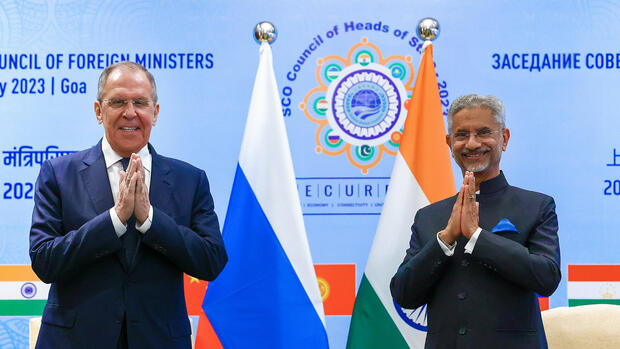Bangkok On his third visit since the beginning of the Ukraine war, Russia’s Foreign Minister Sergey Lavrov is shown India from its best side. His Indian counterpart Subrahmanyam Jaishankar received him on Thursday on the coast of the holiday region of Goa – in the posh hotel Taj Exotica, a five-star hotel with a private beach on the Arabian Sea. The occasion is a meeting of the foreign ministers of the Shanghai Cooperation Organization (SCO) on Friday.
Lavrov is a welcome guest with the Indian government: India and Russia are currently looking for ways to further expand their cooperation. The SCO meeting aims to promote economic cooperation among members. India is also in talks with Russia about a free trade agreement and a bilateral investment protection agreement.
In the oil business, business relations between India and Russia are already breaking all records – and ensure that fuel from Russian oil continues to end up in Europe despite the EU embargo. In April, for the first time, India imported more oil from Russia than from the former main supply countries Saudi Arabia and Iraq combined – 1.7 million barrels per day, according to data provider Vortexa.
At the same time, India is shipping larger quantities of mineral oil products to Europe than ever before: With exports of 365,000 barrels per day, India became Europe’s leading supplier of refined fuels such as diesel in April, according to data from the analysis service Kepler. Russia held this title last year.
Industry observers are convinced that Indian supplies contain processed Russian oil. “Despite all the sanctions, Russian oil is finding its way back to Europe – India is a good example of this,” Kepler oil analyst Viktor Katona told Bloomberg.
India to wash oil from Russia
An embargo against Russian crude oil delivered by ship has been in effect in the EU since December. Since February there has also been a ban on the import of mineral oil products such as diesel and petrol from Russia. The Finland-based think tank Center for Research on Energy and Clean Air (CREA) believes that this embargo is being circumvented with the help of third countries such as India.
According to a CREA report published a few weeks ago, western countries with oil sanctions against Russia, including the EU, have massively increased their imports from those countries that have become the new main recipients of Russian oil.
In addition to India, the organization also accuses China, Turkey, the United Arab Emirates and Singapore of washing Russian oil clean. Overall, their deliveries of oil products to Western sanctioned countries increased by almost 19 billion euros within a year after the start of the Ukraine war. The deals are legal, “since the origin of the products has been changed,” judges CREA – but sees a massive moral problem: “In this way, funds are made available for Putin’s war chest.”
In India, the argument that oil purchases from Russia indirectly support the Russian president’s war has shown itself to be unfazed since the beginning of the invasion of Ukraine. The government in New Delhi points out that it feels primarily obliged to provide its population with affordable energy – and because there are hardly any other buyers, Russian oil is currently particularly cheap.
>> Read here: India wants to do business with Russia despite sanctions
Western governments have recently largely refrained from publicly criticizing India’s dealings with Russia. Despite the sanctions being eroded, they see the country as an important partner, especially in a possible alliance against China.
India wants to export more goods to Russia
The government in New Delhi therefore sees no reason to refrain from closer ties with Russia. During a visit by Russian Deputy Prime Minister Denis Manturov to New Delhi in April, India’s Foreign Minister Jaishankar spoke of “advanced negotiations” on an investment agreement with Russia – and called for talks on a free trade agreement with the Russian-dominated Eurasian Economic Community to be continued quickly.
India hopes to open up a new market for its exporters: the government in New Delhi is urging Russia to buy more goods from India in order to offset the trade deficit caused by massive oil imports.
The question of which currency the two countries want to use to trade with one another remains controversial. In order to avoid the US dollar, India would like to pay its bills in rupees – but there has not yet been an agreement on a new payment mechanism. The question of how trade in the region can be conducted using local currencies is also scheduled to be discussed at Friday’s meeting of SCO foreign ministers.
>> Read here: Why the Russia sanctions are missing the mark – an op-ed
The lack of clarity about the payment modalities has recently slowed down arms deals between India and Russia. According to Bloomberg, Russia has stopped deliveries because of outstanding invoices of around two billion dollars.
If the payment is made in dollars, India fears US sanctions. According to the report, Russia does not want to accept a transfer in rupees. At a meeting of Indian and Russian defense ministers last week, both sides nevertheless agreed to further deepen their military partnership.
More: Divided G20 meeting – China and Russia block final declaration

